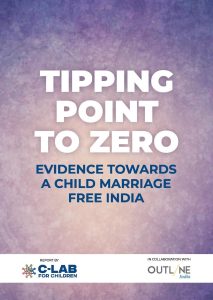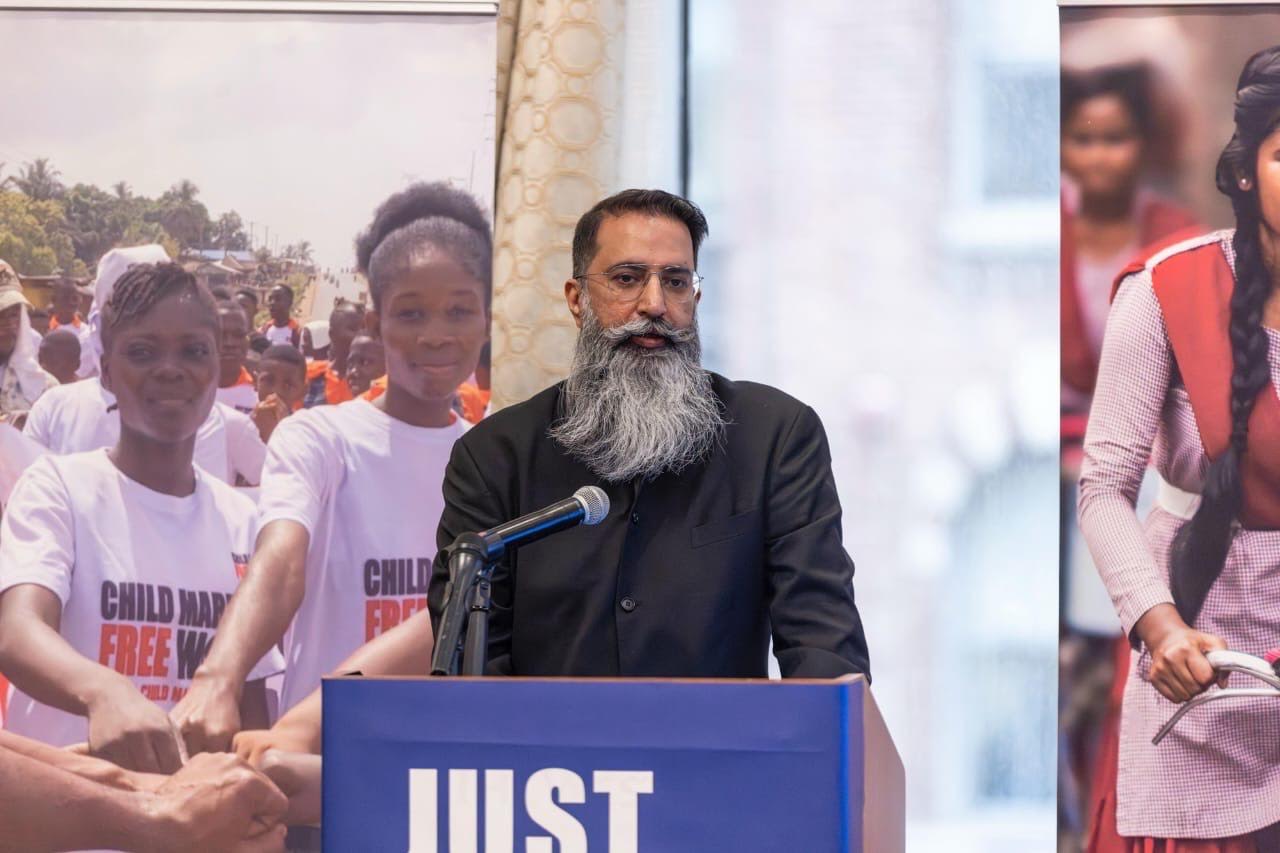•_Assam leads with 84% decline followed by Maharashtra, Bihar, Rajasthan and Karnataka_
•_The report was released by Just Rights for Children, one of the largest networks with over 250 NGOs working for child protection during a side event at UN General Assembly in New York_
•_Recognising government’s initiatives in curbing child marriage, Just Rights for Children announced the ‘Champions of Change’ Award for Chief Minister Himanta Biswa Sarma_
Delhi : Child marriage in India has dropped drastically, with child marriages among girls down by 69% and the cases among boys by 72%, according to a new report. The report, Tipping Point to Zero: Evidence Towards a Child Marriage Free India, released by Just Rights for Children (JRC), highlights arrests and FIRs as the strongest deterrents against child marriage. Assam leads with an 84% decline in child marriages of girls, followed by Maharashtra and Bihar (70% each), Rajasthan (66%) and Karnataka (55%). The report attributes this unprecedented decline to the coordinated action of the Government of India, state governments, and civil society organisations over the past three years. It also stated that 99 per cent of the respondents had either seen or heard about the Government of India’s Bal Vivah Mukt Bharat Campaign, primarily through NGO campaigns, Schools, and Panchayats.
The report was released during a side event at the United Nations General Assembly in New York. It is prepared by the Centre for Legal Action and Behaviour Change for Children (C-LAB), an initiative of JRC Partner India Child Protection. Recognising Assam’s unprecedented success in curbing child marriage, Just Rights for Children also announced the ‘Champions of Change’ Award for Chief Minister Himanta Biswa Sarma. Just Rights for Children is one of the largest network with over 250 NGOs working for child protection.
The findings mark a monumental shift in the country. As recently as 2019–21, three children were being married off every minute, yet only three cases were reported in an entire day. Today, awareness of child marriage laws is near universal and is a transformation unthinkable just a few years ago. The report highlights that NGOs were the main drivers of awareness about the Centre’s Bal Vivah Mukt Bharat campaign launched in 2024, reaching especially high levels in Bihar (93%), Maharashtra (89%) and Assam (88%). Schools played the key role in Rajasthan (87%) and Maharashtra (77%).
Emphasising the convergence of all stakeholders and the application of the rule of law to end this crime against children, Bhuwan Ribhu, Founder of Just Rights for Children, said at the report’s launch, “India is on the verge of ending child marriage transcending the fulfillment of a Sustainable Development Goal to prove to the world that its end is both possible and inevitable. The formula is clear: prevention before protection, protection before prosecution, and prosecution to create deterrence for prevention. This is not just India’s success; it is a blueprint for the world. With strong political will, robust partnerships, community participation, children’s voices at the center, access to social security, and strict enforcement of the law, a child marriage free world is within reach.”
Just Rights for Children works closely with the Centre, state governments, district administrations, law enforcement agencies, community workers and village panchayats to end child marriage by 2030. In terms of education, the report found that in 31 percent of the surveyed villages, all girls in the age 6-18 years were attending school, but huge disparities were seen in Bihar at 9 percent and Maharashtra at 51 percent. Poverty (88%), lack of infrastructure (47%), safety (42%), and lack of transportation (24%) were cited as the barriers in the education of girls. Reasons cited for child marriage included poverty (91%), to provide safety to minor girls (44%), and others cited traditions and norms as the factor leading to the prevalence of child marriage.

From a society that once accepted child marriage as the norm and considered reporting it to the police taboo, India has seen a remarkable shift in recent years. The report shows that 63% of respondents now feel “very comfortable” reporting child marriage, while another 33% say they are “somewhat comfortable” coming forward.
The key recommendations of the report include strict enforcement of child marriage law, better reporting mechanisms, compulsory marriage registration and village-level awareness of the portal of the Bal Vivah Mukt Bharat for the elimination of child marriage by 2030. The report also recommends designating a national day against child marriage to mobilize for a Child Marriage free India.
The report is based on field data from 757 villages from five states, which were chosen zone-wise to represent India’s diverse social and cultural contexts, and adopted the Multistage Stratified Random Sampling. Frontline service providers such as ASHA, Anganwadi workers, school teachers, Auxiliary nurse midwives, Panchayat Raj Institution (PRI) members, etc., were approached to gather the village-level data.
Just Rights for Children organized the high-level UNGA side event “Creating a Child Marriage Free World: Building the Case for Prevention, Protection and Prosecution” along with the office of Dr. Fatima Maada Bio, First Lady of the Republic of Sierra Leone and President of OAFLAD, the Permanent Mission of Sierra Leone and the Government of Kenya, in partnership with the World Jurist Association and Jurists for Children Worldwide. Other speakers at the event included Dr. Najat Maalla M’jid, Special Representative to the Secretary General on Violence Against Children; Åsmund Aukrust, Minister of International Development, Government of Norway; Carren Ageng’o, Principal Secretary, Children Services, Ministry for Gender, Culture and Children Services, Government of Kenya; Isabelle Rome, Ambassador At Large for Human Rights, Government of France; Millie Odhiambo, Member of the Inter-Parliamentary Union; and Kerry Kennedy, President, Robert F. Kennedy Human Rights.
Since 2023, the network has supported over five lakh children in India alone and has been preventing 18 child
marriages per hour. Between April 2023 and September 2025, JRC prevented 397,849 child marriages, rescued 109,548 children from trafficking and forced labour, with more than 74,375 cases filed against traffickers and supported 32,000 survivors of sexual abuse, making JRC the first NGO network to advance the 3Ps of prevention, protection and prosecution to end violence against children.





